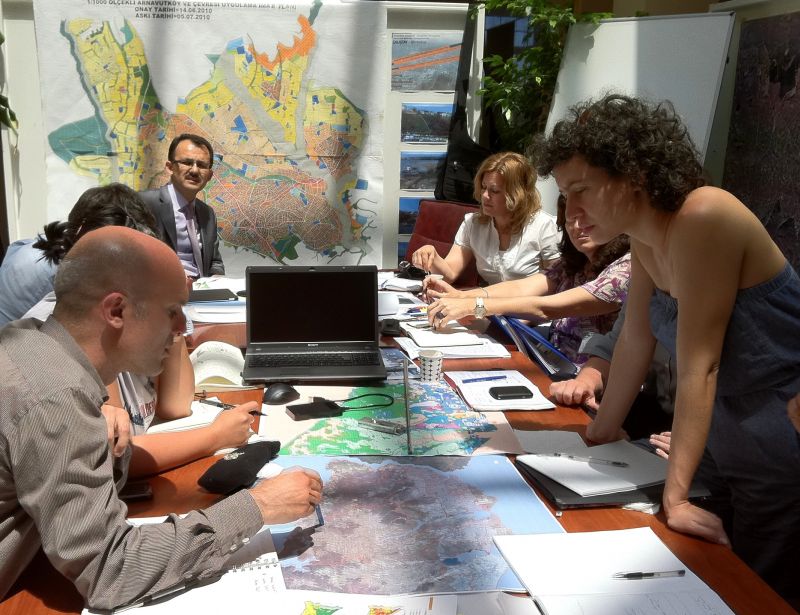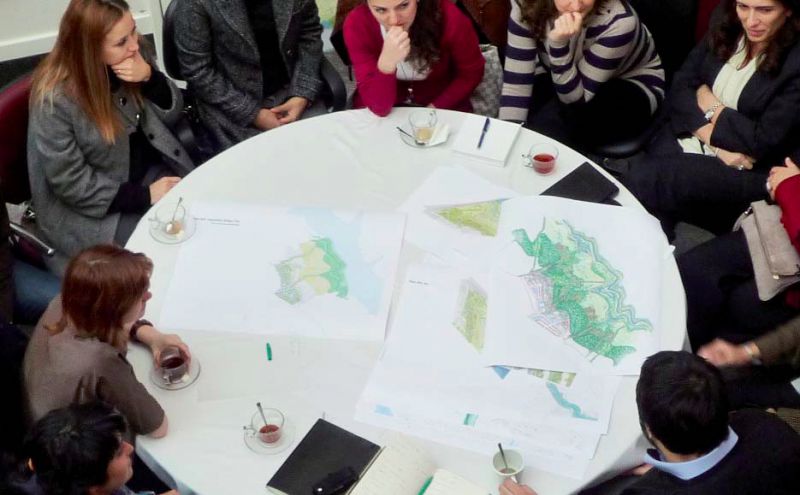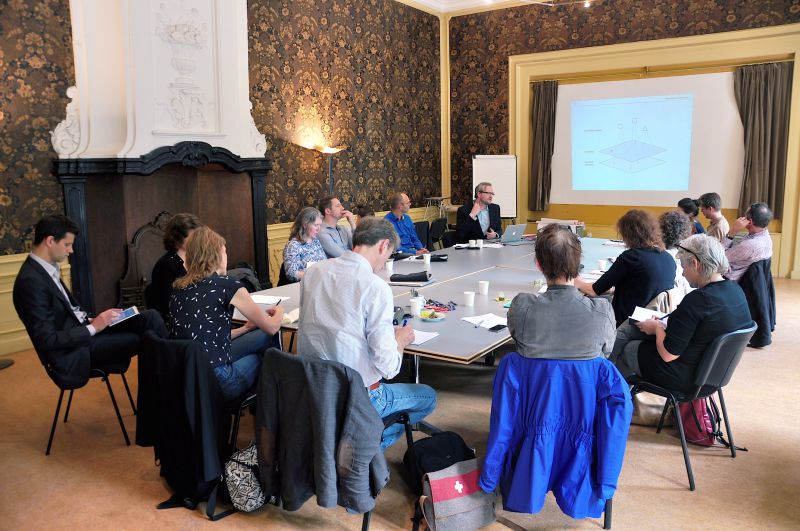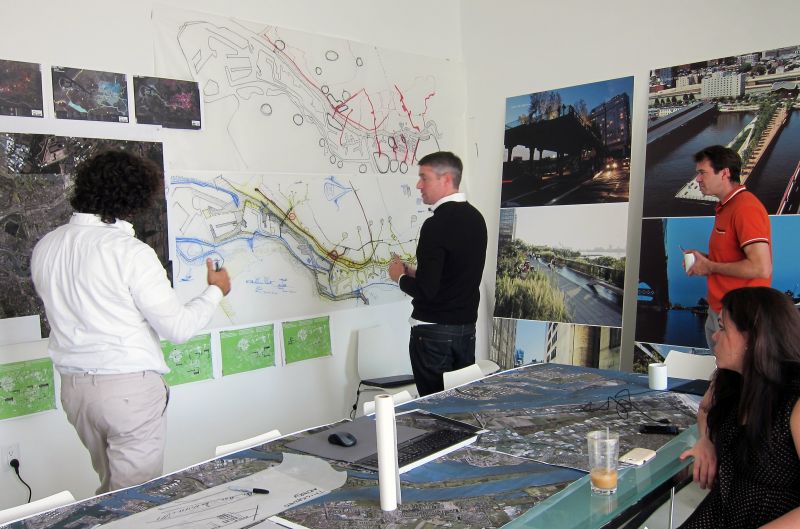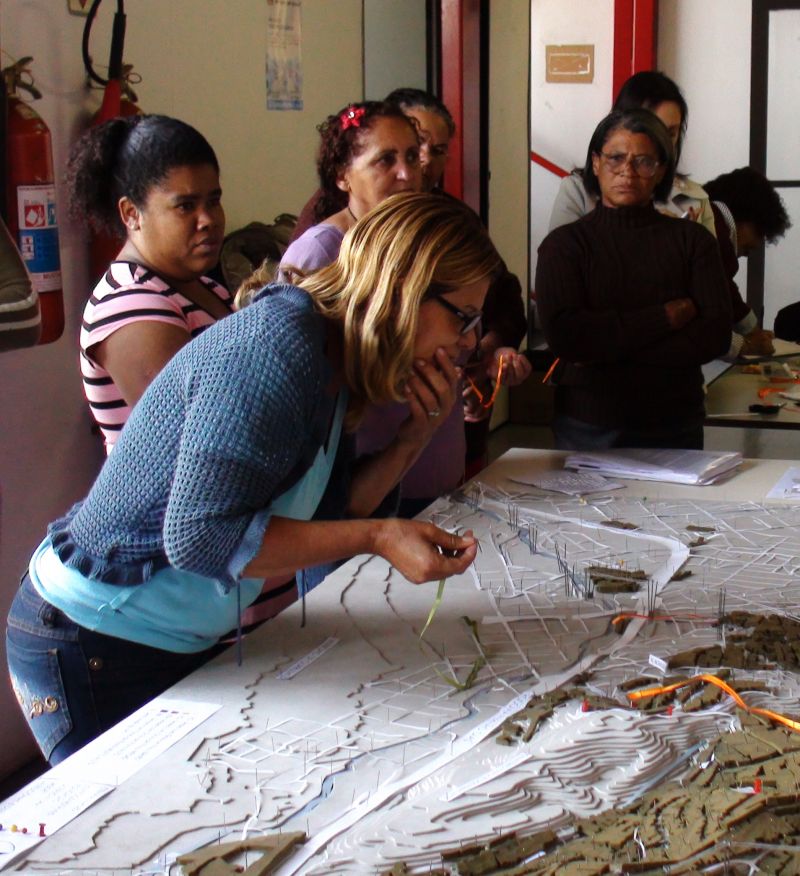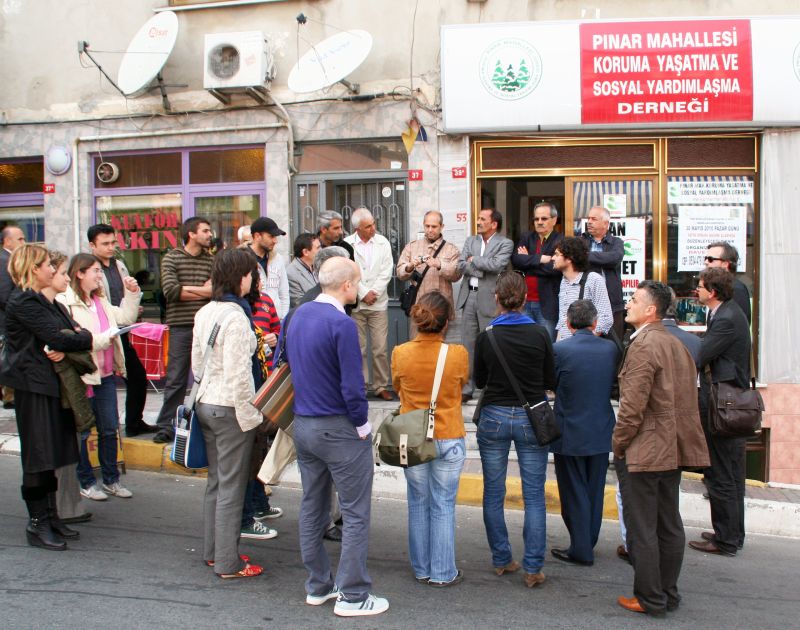The IABR is an architecture biennale that conducts ongoing research into the future of the city. One of its main tools is the Project Atelier: a long-term research by design trajectory in which the IABR in joint partnership with (mostly local) public authorities connects existing challenges to innovative, concrete and applicable solutions.
In the context of the IABR–2016–THE NEXT ECONOMY– the IABR has set up Ateliers together with the Municipality of Rotterdam; the Municipality of Utrecht; an alliance of the Province of Groningen, the Municipality of Groningen, Eemsdelta Region and the Groningen-Assen Region; a coalition of Flemish actors, among them the Brussels-Capital Region, Ruimte Vlaanderen, the Public Waste Agency of Flanders (OVAM) and the Province of Flemish Brabant; the national government of Albania; and a consortium of public and private parties brought together to explore the potential of the North Sea for energy transition.
The ateliers deploy research by design to create spatial and economic development models, establish new alliances, and design detailed proposals for pilot projects. The results will be important anchor points in the main exhibition THE NEXT ECONOMY– and will subsequently go "back home": local implementation is always the objective.
Healthy, Energetic, and Productive
The three Dutch Ateliers that have been launched in Groningen, Utrecht, and Rotterdam are all dedicated to the theme of the 2016 biennale, The Next Economy. They focus on three major issues related to the spatial anticipation of the urban economy of the future in the Netherlands: energy transition, (health) care and ageing, and the circular economy and local manufacturing industry.
IABR–2016–PROJECT ATELIER UTRECHT: HEALTHY CITY
Project Atelier Utrecht is a collaboration between the IABR and the Municipality of Utrecht.
Atelier Master is Joachim Declerck, partner of Architecture Workroom Brussel (AWB).
The central research question is: Which innovative spatial development strategies can contribute to an inclusive, healthy city in which the solidarity between different generations, cultures, and income groups is paramount – a city that can be an inspiration for the rest of the Netherlands and for other countries as well?
For more information, click here.
IABR–2016–PROJECT ATELIER GRONINGEN: TOWARD A NEW ENERGY LANDSCAPE
Project Atelier Groningen is a collaboration between the IABR and the Province of Groningen, the Municipality of Groningen, Eemsdelta\EZ and the Groningen-Assen Region.
Atelier Master is Jandirk Hoekstra, a partner of H+N+S Landscape Architects.
The central research question is: How can a ‘next economy’, based on renewable energy and reduced CO2 emissions, become a new, inspiring perspective for the northern Netherlands in general and the Groningen - Eemshaven region in particular?
For more information, click here.
IABR–2016–PROJECT ATELIER ROTTERDAM: PRODUCTIVE CITY
The Project Atelier Rotterdam is a collaboration between the IABR and the Municipality of Rotterdam.
Atelier master is Daan Zandbelt, associate at De Zwarte Hond.
The central research question is: How can Rotterdam launch a future-proof spatial-economic strategy, based on the regional development of a manufacturing industry that adds value locally, is circular and socially inclusive, and is rooted in the existing dynamics and (spatial) potential of the city and the region?
For more information, click here.
Atelier Productive Metropolis BXL
The aim of 'Atelier Productive Metropolis BXL' is a better match between the changing economy and the organisation of space for productive activities in the capital city's metropolitan area. How can spatial quality and the urban economy reinforce one another, and who creates the productive city?
Atelier Productive Metropolis BXL is a collaboration of the IABR, Architecture Workroom (AWB) and Brussels and Flemish actors, among them the Brussels-Capital Region, Ruimte Vlaanderen, the Public Waste Agency of Flanders (OVAM) and the Province of Flemish Brabant.
For more information, click here
ATELIER ALBANIA
In response to prime minister Edi Rama’s call to designers worldwide to contribute to Next Generation Albania, George Brugmans (IABR), Freek Persyn and Johan Anrys (51N4E, Brussels) proposed Atelier Albania.
The Atelier was established in February 2014 and integrated into the Albanian Ministry of Urban Development’s National Planning Office (AKPT), directly advising the Albanian government. AKPT’s director, Adelina Greca, is the Atelier’s director; Brugmans and Persyn were engaged as special advisors.
For more information, click here
Atelier North Sea: 2050 - An Energetic Odyssey
The European climate objective – 80 to 95 percent reduction of greenhouse gas emissions in 2050 compared with 1990 – requires significant system changes. 2050 – An Energetic Odyssey shows how far-reaching the energy transition from fossil fuels such as oil, coal, and gas to an energy supply largely fed by renewable energy sources actually is.
The project explores a system leap that makes it possible to bridge this gap by the very large-scale production of wind energy on the relatively shallow North Sea for the countries that surround it.
IABR with the Ministry of Economic Affairs, Van Oord, Shell, TenneT, Zeeland Seaports, European Climate Foundation, Natuur & Milieu, RWE, Port of Rotterdam Authority and Port of Amsterdam.
Research by design and animation by H+N+S Landscape Architects, Ecofys and Tungsten Pro
For more information, click here
IABR–Ateliers always focus on applicable results and eventual implementation
In recent years, the IABR has produced Ateliers in, among other places, São Paulo, Istanbul, and Albania. In the Netherlands, the IABR organized Ateliers as a lead partner of the Dutch government and under the authority of the Ministry of Infrastructure and the Environment.
In the context of the previous Biennale, IABR–2014–URBAN BY NATURE–, the IABR collaborated with the Municipality of Rotterdam and the Municipality of Texel as well as with an alliance of the Province of North Brabant, BrabantStad and the Brabant Water Boards. These three Project Ateliers resulted in innovative spatial and economic development models and detailed project proposals, which the authorities involved have subsequently implemented.
The Province of North Brabant is deploying the development principles designed in the IABR–Project Atelier BrabantStad in the Brabant-wide discussion about the future that will lay the foundations for the new Regional Plan for the Province of North Brabant will present in 2018. On a number of sites, work on the transition from regional development principle to local implementation is already underway, for instance in the Dommel Valley.
In December 2014, Texel’s municipal council enthusiastically and unanimously carried the Court of Mayor and Aldermen’s proposal to use the results of the IABR–Project Atelier Planet Texel as guidelines and principles for the future development of the island and to facilitate the implementation of the plan, starting in De Koog. The "Texel Principles", designed in the Atelier, have become established guidelines for governance on the future development of the island.
The Municipality of Rotterdam is using the results of the IABR–Project Atelier The Metabolism of Rotterdam as a source of inspiration and a foundation for further work on the transition to a sustainable and circular economy.
For a complete list of IABR–Project Ateliers and Test Sites, click here
The IABR initiates and produces the Project Ateliers as a lead partner for the Regional and Local Design Dialogue Program, within the framework of the Ministry of Infrastructure and the Environment’s Action Agenda for Architecture and Spatial Design 2013–2016.
